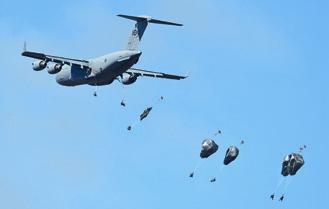Washington’s‘Great Zero-Sum Game’
By Josef Gregory Mahoney

Its easy to become distracted by the many moves made by the U.S. against China. To be sure, theres always a difference between rhetoric and reality, between ambition and actuality, and this has become ever clearer during the Donald Trump and now Joe Biden administrations.
While new developments like the Quadrilateral Security Dialogue (QUAD) summit in Washington, D.C., in September and the trilateral security pact between Australia, the United Kingdom, and the U.S., known as AUKUS, are headline grabbers, and while they are sincere efforts aimed at unsettling Beijing and reinvigorating American hegemony in Asia, a bit of historical perspective is necessary here: these are simply new moves in a longrunning game most notable in recent decades for the declining position of the U.S. and its increasing desperation to find a workable strategy that will contain China, whether once and for all, or for a few more years.
Just another pivot
The first point to make here is that Washington now recognizes it has no hope of containing China unless it builds strategic partnerships with others. While Biden window dresses these efforts as multilateralism, they are in fact an indicator of a growing weakness that in turn exploits the weaknesses of others who, aside from India, can hardly be described as having independent foreign policies.
In short, the ability of the U.S. to impose its will at will is long gone. Now, it needs help from Australia, Japan, India and the UK. It needs to cobble together a tenuous alliance, one that is hardly solid now and unlikely to mature as such through time and risks undermining other alliances in turn. In fact, of all the new containment strategies the U.S. has launched against China since 1949, QUAD and AUKUS are likely to be the least effective and easiest to outflank. Indeed, they are far easier to overcome than the U.S. position in Central Asia, which lasted 20 years.
Americas retreat from Central Asia has been sold as a strategic repositioning necessary for its pivot toward China. And this is one reason why Biden has pushed QUAD and AUKUS so aggressively: He needs a convincing narrative that hes moving the U.S. toward a stronger position. In fact, the U.S. entered Central Asia with two objectives in mind. One, of course, was to respond to Al-Qaeda, which perpetrated the September 11 terror attacks in 2001.
The other was to put a large American military footprint on Central Asia, to project threats against Russias underbelly and Chinas strategically sensitive western regions. This was strategically vital in Chinas case because new coastal-based defensive capacities had all but ensured that conventional American attacks coming from the east, whether by sea or air, would be unable to achieve broader objectives should Washington choose war or if it simply wanted the ability to bully Beijing with threats.

